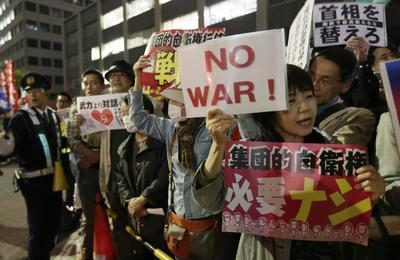The Japanese government under Prime Minister Shinzo Abe is, at the same time, gearing up to reinterpret the very same article in order to permit the exercise of collective self-defence, possibly as early as 22 June. Formal revision of the constitution is the centrepiece of Abe’s agenda, but lingering domestic resistance makes it uncertain if his plan will succeed.
The standoff between proponents and opponents of Japanese constitutional revision is often couched as a battle between reasonable realists and naïve idealists. However, it involves fundamentally different views on how Japan should achieve security and status rather than just different grasps on reality. Three identification processes serve to uphold the abyss between the Abe government and advocates of keeping Article 9 as it is.
First, there is socialisation, or the process whereby states embrace dominant international norms. According to such norms, an economic powerhouse like Japan is defined as ‘normal’ only if it becomes a full-fledged military power with the ability to go to war. Since Article 9 restricts Japan’s acquisition and use of armaments the country is said to be ‘abnormal’.
The past decades have seen constant pressure on Japan to ‘normalise’. Although US occupation authorities took part in the drafting of Japan’s constitution after World War II, Washington has in recent decades been the biggest foreign supporter of the Japanese right’s campaign to revise Article 9. The US government has encouraged Japan to take responsibility for East Asian security commensurate with its economic capabilities.
Second, there is exceptionalisation, or the process whereby states and the boundaries between them are heightened through the identification of unique characteristics in positive terms. To the Japanese left, Article 9 has served such a purpose, although voices complain that post-war political practice has strayed from the ideal. By contrast, the Japanese right argues that Article 9 makes Japan negatively different, or ‘abnormal’.
The nationalist right does not just strive for Japan to become ‘normal’ in security and defence terms. It also aspires for Japan to become positively exceptional, or in Prime Minster Abe’s own words ‘beautiful’. As such, right-wing nationalists continue to beautify Japan’s imperialist past. Recent examples include contentious statements about the war, as well as Abe’s December 2013 visit to the Yasukuni Shrine — the epicentre of Japanese historical revisionism where 14 convicted Class-A war criminals are enshrined.
Third, there is securitisation, or the process whereby states try to defend themselves against perceived existential threats. Japan’s right-wing views Article 9 as such a threat, arguing it has made Japan unfit to deal with external threats.
While many agree that China and North Korea are increasingly threatening to Japan, China’s so-called new ‘assertiveness’ is somewhat exaggerated and North Korea’s sabre rattling is better interpreted as strongly defensive. Japan’s perception of China and North Korea as existential threats, rather than merely carrying out threatening behaviour, is intimately entwined with Japanese identification processes and the domestic political battle over Article 9.
Attempts to reinterpret and revise Japan’s constitution are partly the result of Japanese policymakers and citizens adopting powerful international norms on how ‘normal’ powers should behave. However, many within and outside Japan feel that Japan cannot be trusted with a more permissive constitution as long as senior government officials keep diluting historical facts.
The Nobel Committee’s decision to accept the nomination of Article 9 for the 2014 Peace Prize supports this line of thinking. However, the broader implication is more radical: ultimately the nomination challenges the dominant idea that an ability to go to war defines ‘normal’ state conduct and gives states recognition, status and power. This is where the promise of Article 9 lies, both for Japan and for the world.
If Article 9 is protected and if Japan’s security and defence policy practice is better aligned with it, it could develop into Japan’s most significant yet untapped soft power resource. It could provide Japan with all the power, status, and recognition that it is longing for. For the world, Article 9 serves as a powerful reminder that there is nothing inevitable or ‘normal’ about arms races and wars.
Linus Hagström is a Senior Research Fellow and East Asia Program Director at the Swedish Institute of International Affairs.
He recently published the article ‘The ‘Abnormal’ State: Identity, Norm/Exception and Japan‘, in the European Journal of International Relations.


That’s brilliant. Funny they never got around to it before. Will they also revoke President Obama’s Peace Prize, or convert to the Nobel Peace Prize for War?